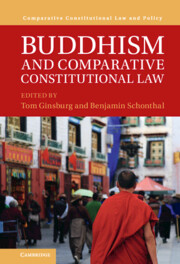Buddhism and Comparative Constitutional Law
Buddhism and Comparative Constitutional Law offers the first comprehensive account of the entanglements of Buddhism and constitutional law in Sri Lanka, Myanmar, Thailand, Cambodia, Vietnam, Tibet, Bhutan, China, Mongolia, Korea, and Japan. Bringing together an interdisciplinary team of experts, the volume offers a detailed portrait of “the Buddhist-constitutional complex,” demonstrating the intricate and powerful ways in which Buddhist and constitutional ideas merge, interact, and co-evolve. The authors also highlight the important ways in which Buddhist actors have (re)conceived Western liberal ideals such as constitutionalism, the rule of law, and secularism. Available Open Access on Cambridge Core, this trans-disciplinary volume is written to be accessible to a non-specialist audience.
Tom Ginsburg is the Leo Spitz Professor of International Law at the University of Chicago and a Research Professor at the American Bar Foundation.
Benjamin Schonthal is Professor of Buddhist Studies and Head of the Religion Programme at the University of Otago, where he also co-directs the Otago Centre for Law and Society.

